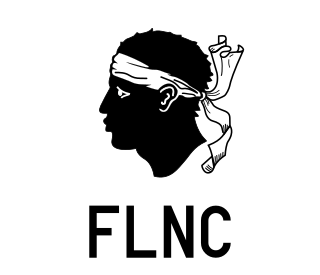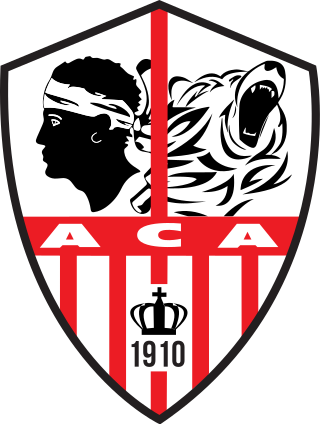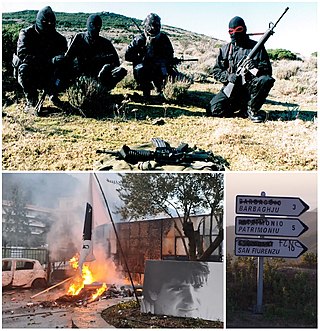Related Research Articles

Corse-du-Sud is an administrative department of France, consisting of the southern part of the island of Corsica. The corresponding departmental territorial collectivity merged with that of Haute-Corse on 1 January 2018, forming the single territorial collectivity of Corsica, with territorial elections coinciding with the dissolution of the separate council. Although its administrative powers were ceded to the new territorial collectivity, it continues to remain an administrative department in its own right. In 2019, it had a population of 158,507.

Haute-Corse is a department of France, consisting of the northern part of the island of Corsica. The corresponding departmental territorial collectivity merged with that of Corse-du-Sud on 1 January 2018, forming the single territorial collectivity of Corsica, with territorial elections coinciding with the dissolution of the separate councils. However, even though its administrative powers were ceded to the new territorial collectivity, it continues to remain an administrative department in its own right. In 2019, it had a population of 181,933.

The National Liberation Front of Corsica is a politico-military organization founded in 1976 that advocates an independent state on the island of Corsica, separated from France. The FLNC has been one united organization from 1976 to 1990. In 1990, it split into two factions of comparable size : FLNC-Canal Habituel and FLNC-Canal Historique . Both factions had war between each other and a few dozens nationalists died between 1993 and 1996. Then, there were new merging processes and new splits. In the 2020s, there are still two active and serious FLNCs : the FLNC-Union des Combattants and the FLNC du 22 Octobre. They both signed statements together to revendicate armed actions and to give strategical instructions to the Corsican nationalists. The political party Nazione was founded in 2024 with the support of the FLNC. It is led by Petr'Antu Tomasi, Ghjuvan-Guidu Talamoni and Josepha Giacometti-Piredda, with the participation of the former FLNC political prisoner during 24 years, Carlu Santoni. The FLNC has been active in Corsica but also in French mainland.

Athletic Club Ajaccien, commonly referred to as AC Ajaccio, ACA or simply Ajaccio, is a French professional football club based in the city of Ajaccio on the island of Corsica. The club was founded in 1910 and plays in the Ligue 2, the second tier of the French football league system. Ajaccio play their home matches at the Stade Michel Moretti and are rivals with fellow Corsican club Bastia, with whom they contest the Corsica derby.

Calvi is a commune in the Haute-Corse department of France on the island of Corsica.

Ange Mancini is the French intelligence national coordinator.
Armata Corsa was an underground separatist terrorist organization in Corsica, founded in 1999 and disbanded around 2001.

Gazélec Football Club Ajaccio, commonly referred to as GFC Ajaccio, GFCA, Gazélec Ajaccio or simply Gazélec, is a French football club from Ajaccio, Corsica. Founded in 1910, Gazélec played one season in Ligue 1 in the 2015–16 season. As of the 2024–25 season, it competes in the Régional 1, the sixth tier of the French football league system.
Yvan Colonna was a Corsican nationalist convicted for the 1998 assassination of the prefect of Corse-du-Sud, Claude Érignac. He was beaten to death in prison by an inmate, sparking riots.
Claude Jean Pierre Érignac was a French prefect on the island of Corsica.
The Corsican mafia is a collective of criminal groups originating from Corsica. The Corsican mafia is tied to both the French underworld and the Italian organized crime groups. The Corsican mafia is an influential organized crime structure operating in France, as well as North African and Latin American countries.

The Italian occupation of Corsica refers to the military occupation by the Kingdom of Italy of the French island of Corsica during the Second World War, from November 1942 to September 1943. After an initial period of increased control over the island, by early spring 1943 the Maquis had begun to occupy the hinterland. In the aftermath of the Armistice of Cassibile, the Italian capitulation to the Allies, the Germans evacuated Sardinia via Corsica and occupied the island with the support of Italian units who had defected to them. Italian troops under Giovanni Magli, the Maquis and Free French Forces joined forces against the Germans and liberated the island.
Gian Paolo Borghetti was a Corsican writer, poet and politician. He has been described as "one of the greatest Corsican poets writing in Italian", and "one of the most brilliant Corsican intellectuals of the nineteenth century".

The Corsican conflict is an armed and political conflict on the island of Corsica which began in 1976 between the government of France and Corsican nationalist militant groups, mainly the National Liberation Front of Corsica and factions of the group. Beginning in the 1970s, the Corsican conflict peaked in the 1980s before Corsican nationalist groups and the French government reached a truce with one of the two main splinters of the FLNC, the FLNC-Union of Combattants in June 2014. In 2016, the other main splinter, the FLNC-22nd of October also declared a truce. It is currently ongoing following the 2022 Corsica unrest and the return to arms of the FLNC-UC and FLNC-22U.

The Corsican Donkey, French: Âne corse, Corsican: U sumeru corsu, is a breed of domestic donkey from the Mediterranean island of Corsica, a région and territorial collectivity of France. It is not recognised by the Ministère de l'agriculture, de l'agroalimentaire et de la forêt, the French ministry of agriculture, or by the Haras Nationaux, the French national stud; nor is it reported to the DAD-IS database of the FAO. Its numbers have fallen alarmingly; two associations are seeking its official recognition as a breed.

Laurent Marcangeli is a French politician who has been serving as a member of the National Assembly from 2012 to 2017 and again from 2022, representing Corse-du-Sud's 1st constituency.
In March 2022, the island of Corsica, France, saw protests in response to a prison attack on nationalist leader Yvan Colonna. There were rallies in the main cities of Ajaccio, Calvi and Bastia that descended into violent clashes between police and protestors. Protestors threw stones and flares at gendarmes.
Jean-Hugues Dieudonné Colonna is a French Socialist Party politician.
The Petit Bar Gang is an organized crime group from Corsica. It gets its name from the "Petit Bar," an establishment in Ajaccio, owned by Ange-Marie Michelosi, a lieutenant of Jean-Jérôme Colonna, from whose gang it is said to originate.
Anti-Corsican sentiment or Anti-Corsianism is hostility, rejection, discrimination against and/or hatred towards Corsica, Corsican culture or the Corsican ethnic group. In the 21st century, some denounce the use of the term as a victimization phenomenon.
References
- Much of the material in this article has been translated from the article Bernard Bonnet on French Wikipedia.
- Denis Touret (2007-02-12). "France, Corse, Etat de droit (Etat soeur), nationalistes, justice, émissaire, préfet Bernard Bonnet" . Retrieved 2007-04-03.